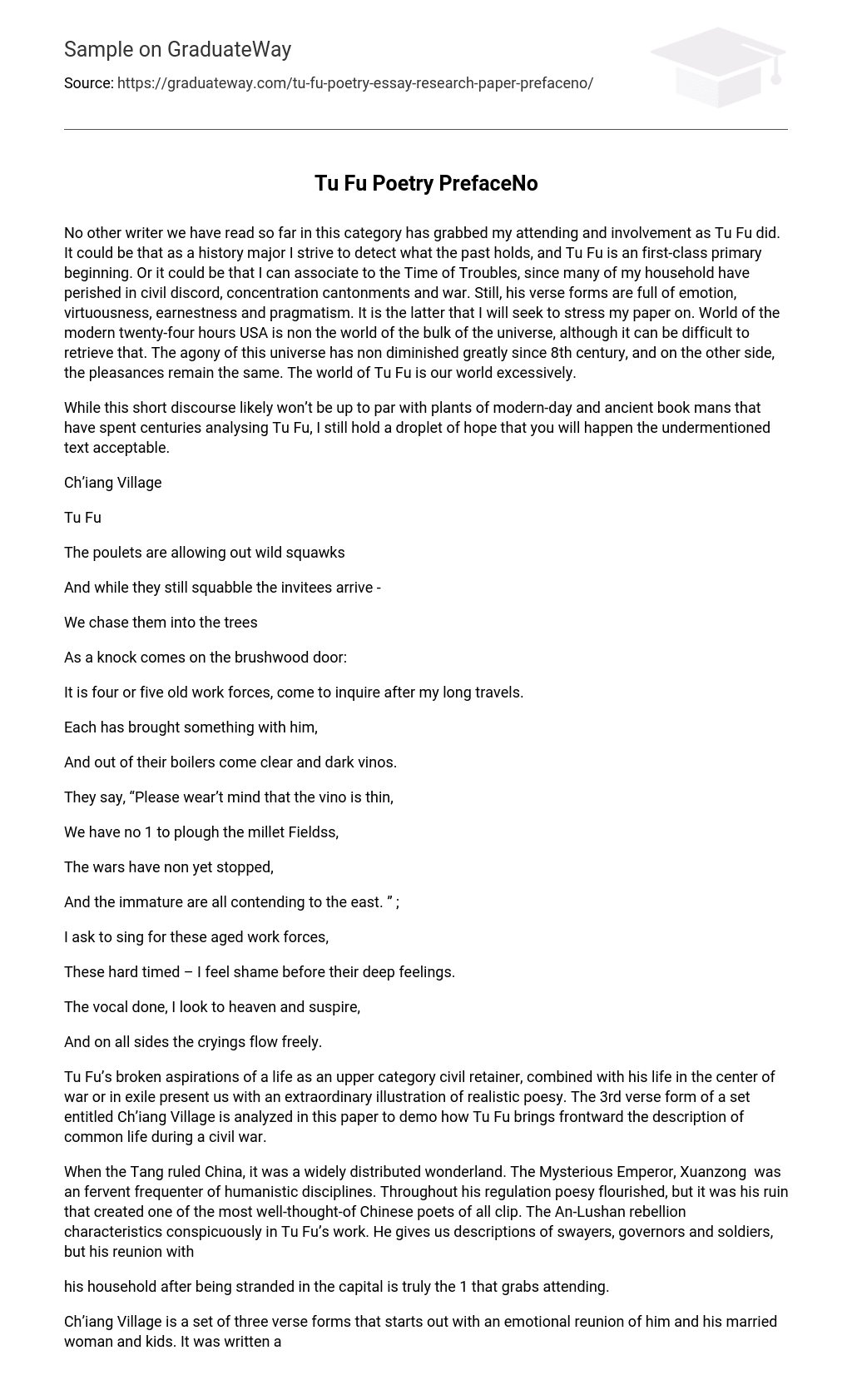No other writer we have read so far in this category has grabbed my attending and involvement as Tu Fu did. It could be that as a history major I strive to detect what the past holds, and Tu Fu is an first-class primary beginning. Or it could be that I can associate to the Time of Troubles, since many of my household have perished in civil discord, concentration cantonments and war. Still, his verse forms are full of emotion, virtuousness, earnestness and pragmatism. It is the latter that I will seek to stress my paper on. World of the modern twenty-four hours USA is non the world of the bulk of the universe, although it can be difficult to retrieve that. The agony of this universe has non diminished greatly since 8th century, and on the other side, the pleasances remain the same. The world of Tu Fu is our world excessively.
While this short discourse likely won’t be up to par with plants of modern-day and ancient book mans that have spent centuries analysing Tu Fu, I still hold a droplet of hope that you will happen the undermentioned text acceptable.
Ch’iang Village
Tu Fu
The poulets are allowing out wild squawks
And while they still squabble the invitees arrive –
We chase them into the trees
As a knock comes on the brushwood door:
It is four or five old work forces, come to inquire after my long travels.
Each has brought something with him,
And out of their boilers come clear and dark vinos.
They say, “Please wear’t mind that the vino is thin,
We have no 1 to plough the millet Fieldss,
The wars have non yet stopped,
And the immature are all contending to the east. ” ;
I ask to sing for these aged work forces,
These hard timed – I feel shame before their deep feelings.
The vocal done, I look to heaven and suspire,
And on all sides the cryings flow freely.
Tu Fu’s broken aspirations of a life as an upper category civil retainer, combined with his life in the center of war or in exile present us with an extraordinary illustration of realistic poesy. The 3rd verse form of a set entitled Ch’iang Village is analyzed in this paper to demo how Tu Fu brings frontward the description of common life during a civil war.
When the Tang ruled China, it was a widely distributed wonderland. The Mysterious Emperor, Xuanzong was an fervent frequenter of humanistic disciplines. Throughout his regulation poesy flourished, but it was his ruin that created one of the most well-thought-of Chinese poets of all clip. The An-Lushan rebellion characteristics conspicuously in Tu Fu’s work. He gives us descriptions of swayers, governors and soldiers, but his reunion with
his household after being stranded in the capital is truly the 1 that grabs attending.
Ch’iang Village is a set of three verse forms that starts out with an emotional reunion of him and his married woman and kids. It was written about a twelvemonth after the beginning of the rebellion. Both capitals were already taken and Tu Fu was behind enemy lines. When he escaped, as a true Confucianist he made his manner to the emperor and non his household. It was merely after he was granted leave, he made his manner to this now celebrated small town to see them. The last verse form of the set ( see above ) describes him after he has already settled in. It is non a cheerless verse form, but it shows the strain that the rebellion has placed on everyone, no affair how distant from the combat.
Tu Fu starts out with a description of poulets and they chaos they cause ( he makes it so easy to conceive of ) , a regular rural juncture, non even deserving adverting. But it is merely a fast one to do us believe everything is all right, everyone is happy. Then a knock, and some people enter. They are non soldiers or bloody-minded Rebels. They are merely some seniors who came to pay their respects. They brought a spot of vino ( see, the pleasances are still the same ) and they want to hear about his travels, his escapades. Or do they? May be they would wish to happen out the destiny of their kids. It turns out all the immature are off, some combat, some deceasing. The Fieldss are traveling unploughed, a symbol of the excess burden work placed on the people still left in the small town. But line 11, “The wars have non yet stopped” makes you think about the sense of Confucianist responsibility Tu Fu feels. Subjects of the emperor must carry through their responsibility, and sooner or later the war will be over and everything will travel back to normal. There is no disdain for the war, but more an credence of the inevitable. And yet Tu Fu feels ashamed. Is it because he merely came back from the emperor’s tribunal and is associated with the battle, or is it because he himself is non contending while the senior’s kids are? Or could it be the same sort of shame and guilt a subsister of a auto clang feels before the parents of his friend, who perished in that same wreck? Whatever the reply is, they all feel for each other and “cryings flow freely”.
Ch’iang Village brings frontward compassion for others and it has a truly humane, warm touch. What starts out with nescient poulets ends with cryings. The emotions the seniors feel acquire transposed onto Tu Fu himself. He is no alien to hardship; he excessively was separated from his household. And yet alternatively of demoing his strength to them, he cries with them. This is the sort of pragmatism that grabs you and won’t allow travel and this is the ground that 13 centuries later we can still associate to Tu Fu’s poesy.





